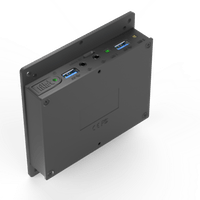By Warren Miller, contributing writer
One of the difficulties with addressing IoT applications is understanding application requirements early enough to deliver a solution when it’s most needed. Too early and the need isn’t there yet; too late and customers have moved on. Even in the industrial segment of the IoT market — and we traditionally don’t think of the industrial segment as being fast-moving — the growth of the IoT has turned even this segment into one that is difficult to predict. One way to make it easier to address fast-moving market requirements is to provide a modular design that can easily be adapted, even after being placed in the field, to new and emerging requirements.
The Israeli company CompuLab has updated its fitlet fanless minicomputer to provide more functionality for IoT applications using a modular approach. The updated minicomputer, dubbed the fitlet2, has stock configurations that come with Intel Atom x7-E3950, x5-E3930 or Celeron J3455 processors, but other configurations are also available when ordered in bulk. The passively cooled unit supports up to 16 GB of DDR3L RAM with a choice of eMMC, SSD, or hybrid HDD/SSD storage options. The fitlet2 can run Windows 10 IoT Enterprise edition and Linus Mint, among other operating systems.
In order to cover the widest set of industrial IoT applications, extension modules are available for a variety of IoT applications and include second-generation Function and Connectivity Extension T-Cards. Modules currently available include a module that supports 4G cellular networks as well as Wi-Fi and a module that adds four additional USB ports to the configuration. CompuLab is still developing more extension cards, and the system supports independent module development, as well.

The fitlet2 modular industrial minicomputer. Image source: fit-pc.com.
The ability to easily develop independent modules is an exciting option for industrial IoT system developers. Instead of designing the entire system from scratch, the fitlet2 can be used as a robust starting point. Only the specific additional features required by the target application need to be developed, and they can be implemented as an add-on module. Need to support a new communications interface? Just create an add-on module. Need to have specialized analog I/O? Just create an add-on module. In fact, there might be a good market for third parties to create add-on modules and sell them directly to fitlet2 customers.
As more add-on modules are developed, it could be easier for customers to expand and extend their industrial IoT systems instead of needing to rip out and replace the whole system, while add-ons can make it easy to upgrade the existing platform. This not only provides additional flexibility for adding new capabilities but also extends system lifetime and better leverages the initial investment. If we know anything about the IoT application space, it will continue to grow and morph in unpredictable directions. A flexible and modular approach to Industrial IoT solutions seems like a good bet.
Advertisement
Learn more about Electronic Products Magazine





